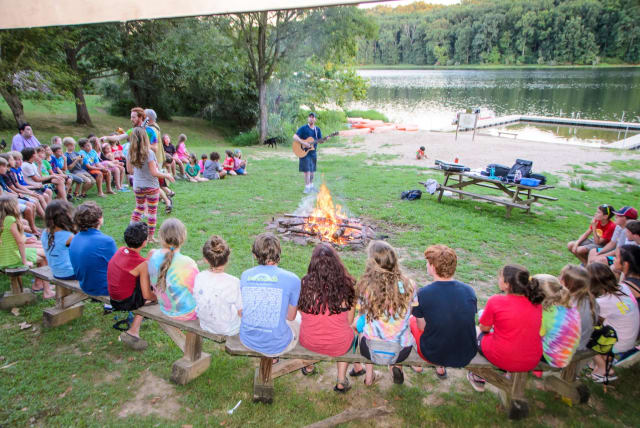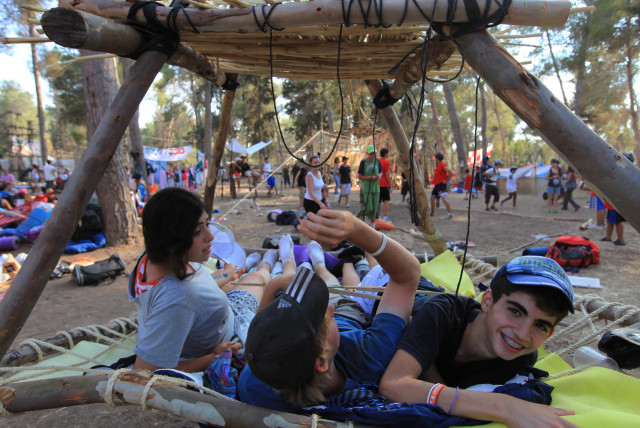Jewish Agency's emissaries to return to US camps after October 7 trauma

Many Israelis are enthusiastic about working as emissaries this summer, and the Jewish Agency says it's had no issues with recruiting.
Daria Cohen is set to serve as a Jewish Agency counselor in an American camp this summer, overseeing swimming lessons, boating, sailing and more -- a sharp contrast to a few months ago when she was hiding from terrorists for thirty hours.
As soon as the heavy rocket barrage bombarded Kibbutz Sufa, Cohen understood from the volume of fire that it was an abnormal incident. She took to her bomb shelter, but through WhatsApp, she soon learned that terrorists had entered the kibbutz.
"I was alone, and I didn't have a defensive weapon," said Cohen.For hours, Cohen waited for help to arrive. Three residents were killed in the attack by dozens of terrorists. Eventually, the local security force and IDF reconquered the kibbutz. The security team escorted Cohen from her shelter to her family's home, where they spent the rest of the day in the bomb shelter together. At times, they didn't have internet access, and couldn't tell what was happening in their hometown. When Sufa had been secured, her family was evacuated to Eilat. Since then, her family has been staying in Ramat Gan along with other members of the kibbutz, but others are being boarded at Ofakim.
One of the great comforts and sources of strength during her ordeal has been the dozen of messages she received from the campers she met at the Massachusetts overnight Jewish girls camp, Camp Pembroke, where she had twice served as a Jewish agency emissary. Cohen Camps, to which Camp Pembroke is part of, called on camper's families to donate to a fund to help repair and rebuild Cohen's town.
To her campers and the staff at Camp Pembroke, Cohen said that she wants "to tell them thank you, personally."
Despite still being in the aftermath of October 7, still knowing people who are being held hostage by Hamas, and not even having a home to call her own, Daria still wants to be an emissary on her third trip to Camp Pembroke.
"I still think that this shlichut is the right thing to do," said Cohen.
Jewish Agency has 1500 emissaries at 170 summer camps
Cohen is one of the Jewish Agency's 1500 emissaries at 170 different camps in North America. Like Cohen, many Israelis are enthusiastic about working as emissaries this summer, and the Agency has had no issues with recruiting, said Jewish Agency Summer Emissary Program director Gal Atia. Many of these emissaries will have had their own experiences with the October 7 Massacre, and many served as soldiers or reservists during the war.
Atia said that in April they would prepare the emissaries about their roles, about North American summer camps -- but this year they will be helping to learn how to to talk about their experiences with the pogrom and the war.
"We want to give them all the tools they need to be able to tell their story," said Atia, noting that some may not want to share what happened to them. "It also may be inappropriate to share certain things about the war."
Cohen said that she didn't believe it was necessary to tell the campers everything, but to share in the feelings of support and the sense of the tragedy, and to express the connection to Israel.
"We're talking about children that are sometimes too young to understand the event and what is terrorism," said Cohen.
The emissaries are also going to be prepared to deal with the angst and suffering that the kids encounter in North America. Since October 7 there has been a wave of antisemitism across the world, and the emissaries will need to understand how the children's encounters with antisemitism, said Atia.
Atia said that the hope that the emissaries carried would be a strengthened connection to Israel. The emissaries may arrive in places where people are more critical of Israel, but even if they don't agree with these campers and staff, "it's important to come with the approach that these are family, and it's okay to disagree as family."
"If Israel isn't represented there, maybe there will be another narrative pushed about Israel that isn't authentic," said Atia.
In some camps, the campers and staff may not have been familiar with Israel at all.
"The fact that you represent Israel is also important, and gives them sometimes their first encounter with Israel," said Cohen.
Jewish summer camps have become an important institution for North American Jews as fewer children are being sent to Jewish day schools, said Atia. Families are still sending them to camps so that they have at least one place to learn about their Jewish identity. Israel is a part of that identity.
This summer, the meetings between Israelis and American Jews in the summer camps will come after a very sensitive period in the Jewish people's history, said Atia.
Cohen said that "Shlichut [being an emissary] is a must-have experience, and it creates connections that last a long time."
Jerusalem Post Store
`; document.getElementById("linkPremium").innerHTML = cont; var divWithLink = document.getElementById("premium-link"); if (divWithLink !== null && divWithLink !== 'undefined') { divWithLink.style.border = "solid 1px #cb0f3e"; divWithLink.style.textAlign = "center"; divWithLink.style.marginBottom = "15px"; divWithLink.style.marginTop = "15px"; divWithLink.style.width = "100%"; divWithLink.style.backgroundColor = "#122952"; divWithLink.style.color = "#ffffff"; divWithLink.style.lineHeight = "1.5"; } } (function (v, i) { });

